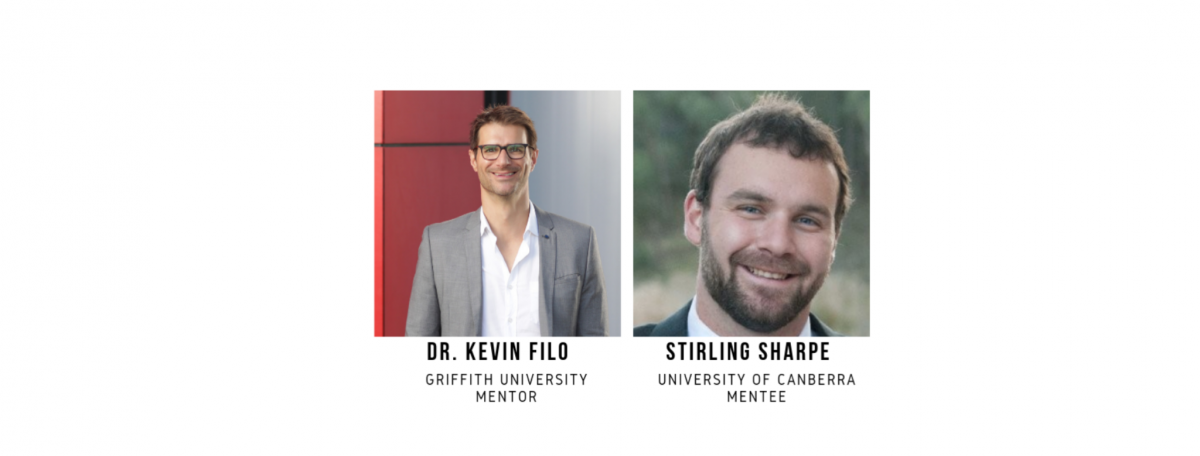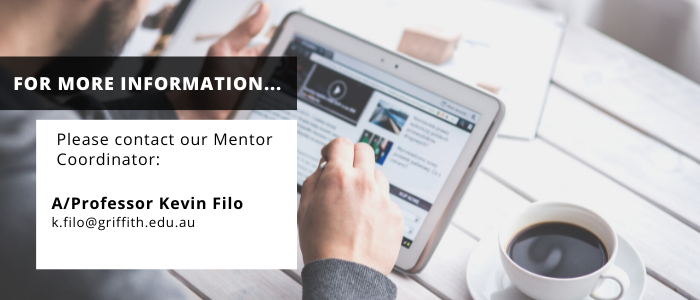In 2017 SMAANZ launched a mentor program that is exclusively available to SMAANZ members. The program aims to help individuals in the SMAANZ community seek opportunities to grow and develop.
We are excited to feature our first Q&A feature which is an interview with Dr Kevin Filo (Griffith University) and Stirling Sharpe (University of Canberra) who were paired through the SMAANZ Mentor Program in 2018.

Q1) Why did you apply for the SMAANZ Mentor Program (either as a Mentor or Mentee?)
Dr Kevin Filo:
“I signed on as a mentor as I viewed it as a way to contribute to the SMAANZ community. I first remember hearing about it at SMAANZ 2013 in Dunedin and thought it was an excellent initiative. Beyond the broad contribution to SMAANZ, it seemed like an excellent way to meet new scholars and/or interact with scholars I already knew in different, potentially more meaningful, ways. And, in doing so, hopefully I could share the insights I have gained thus far in my career, whilst no doubt learning from the scholar with whom I was paired. Thus far, all of this has been achieved“
Stirling Sharpe:
“I applied for the SMAANZ Mentor Program for two main reasons – Firstly, the sport management department at my university is small and I have always valued external support and, second, the quality of academics that SMAANZ attracts is very high. As such, I was confident that I would be paired with a mentor who is highly skilled and would be well equipped to assist me academically and with setting career goals and identifying a suitable path to achieve those goals. A secondary reason for joining the program is to connect with higher ranking academics in the SMAANZ community to further build my professional network. So far, all of these objectives have been progressed. The relationship I have built with Dr. Filo so far has been positive; he is a fantastic mentor who is willing to share information and opinions”
Q2) What did you hope to gain from joining the program? How have you worked together so far? Do you have anything planned in the near future?
Dr Kevin Filo:
“Stirling and I have interacted via email at the end of 2018 and early part of 2019. These email exchanges allowed us to get to know one another a bit better, as well as come to an understanding of our hopes and expectations for the program. From there, we met up for breakfast whilst Stirling was on the Gold Coast in Feb 2019. Once again, we got to trade stories, ask each other questions about academia and life in general, and get to know one another better. I had met Stirling previously at a few different SMAANZ conferences and have always enjoyed our conversations. And now this dialogue has been extended further through the mentoring program and will hopefully only continue from here. I am hoping we can collaborate together on research in the near future too.We do not have formal plans in place beyond continued correspondence via email. We will also see each other at SMAANZ 2019. And I hope Stirling is able to attend the mid-year HDR gathering”
Stirling Sharpe:
“Specifically, I was hoping to be paired with an academic who could contribute to the theoretical basis of my PhD studies – thankfully, Dr. Filo has some experience in identity theory and I have referenced his work. It is useful to have access to him in this way. In applying for the program I expected that this would have to occur via distance and luckily I happened to be on the Gold Coast for work and was able to meet with Dr. Filo for breakfast one morning. Otherwise our interactions have been via email. In the future we will meet in person where possible but also speak on the phone. We do not have a set plan on what the future will hold and we expect this to evolve organically; perhaps it could include a co-authored paper, or simply just an ongoing conversation?”
Q3) Why should others get involved and apply to be part of the SMAANZ Mentor Program?
Dr Kevin Filo:
“There is really no argument against it. The obvious reasons are: giving back, learning from others, extending and enriching your network, etc. There is a certain casualness to it that is really refreshing. The guidelines are (rightfully and, I think, purposefully) loose allowing the mentor and mentee to determine how the pairing can evolve. It begins with informal conversations, can develop further from there, and then hopefully leads to increased connection and potentially further opportunities. That is really not that far off from what the SMAANZ experience is all about. I strongly endorse the program”
Stirling Sharpe:
“I’d encourage others to be part of the program as a mentee because it will allow you to access an academic who is not from your university and they will bring another perspective to your academic career and studies. For my mind, having a diverse range of ideas and input into your work is important. The relationship is determined by the mentor and mentee so you can shape this to be something suited to your exact objectives for being in the program. It is a free program, there are benefits to it – there is no reason not to get involved.
